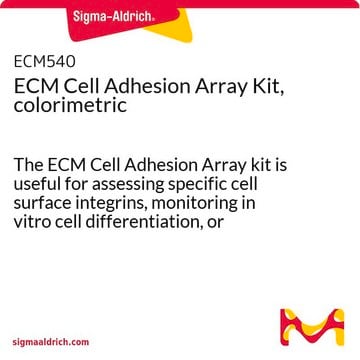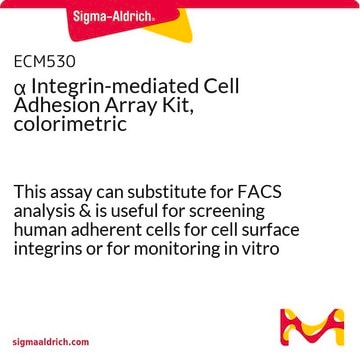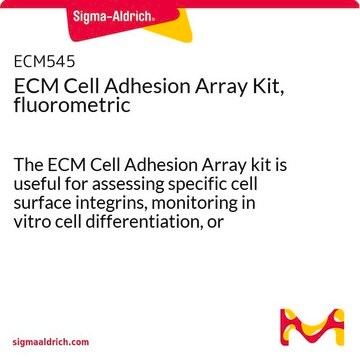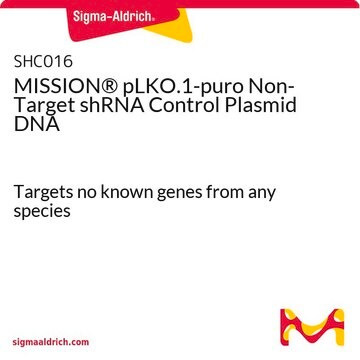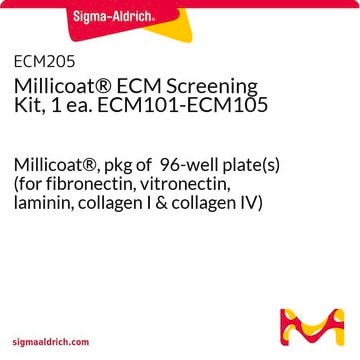ECM531
β Integrin-mediated Cell Adhesion Array Kit, colorimetric
This assay can substitute for FACS analysis & is useful for screening human adherent cells for cell surface integrins or for monitoring in vitro cell differentiation or genetic modification of cells.
登录查看公司和协议定价
所有图片(1)
About This Item
分類程式碼代碼:
12352207
eCl@ss:
32161000
NACRES:
NA.84
推荐产品
品質等級
物種活性
human
製造商/商標名
Chemicon®
技術
cell based assay: suitable
檢測方法
colorimetric
運輸包裝
wet ice
基因資訊
human ... ITGB1(3688)
一般說明
Introduction:
Cell adhesion plays a major role in cellular communication and regulation, and is of fundamental importance in the development and maintenance of tissues. A family of cell surface receptors, the integrins, mediates cell attachment to proteins of the extracellular matrix. Integrins are heterodimer molecules containing an alpha and beta transmembrane glycoprotein subunit that are non-covalently bound together (1-2). Historically, antibodies have been used to determine the integrin profiles of cells by immunoprecipitation, immunofluorescence, immunoblotting, and flow cytometry. These methods are time-consuming, laborious or require sophisticated equipment.
The CHEMICON® Beta Integrin-Mediated Cell Adhesion Array kit is designed as a cost effective, efficient method for identification of cell surface integrins. The kit format uses 12 x 8-well removable strips in a plate frame for convenience and flexibility in designing assays. The Integrin-Mediated Cell Adhesion Array can be completed within 1-2 hours, providing a rapid, quantitative assay for the characterization of beta integrin surface expression.
In addition, Chemicon continues to provide numerous migration, invasion, and adhesion products including:
· Alpha Integrin-Mediated Cell Adhesion Array (ECM530)
· Alpha/Beta Integrin-Mediated Cell Adhesion Array Combo Kit (ECM532)
· QCM 8μm 96-well Chemotaxis Cell Migration Assay (ECM510)
· QCM 5μm 96-well Chemotaxis Cell Migration Assay (ECM512)
· QCM 3μm 96-well Chemotaxis Cell Migration Assay (ECM515)
· QCM 96-well Cell Invasion Assay (ECM555)
· 24-well Insert Cell Migration and Invasion Assay Systems
· CytoMatrix Cell Adhesion strips (ECM protein coated)
· QuantiMatrix ECM protein ELISA kits
Test Principle:
The CHEMICON Beta Integrin-Mediated Cell Adhesion Array uses mouse monoclonal antibodies generated against human beta integrins/subunits (Ãeta1, Ãeta2, Ãeta3, Ãeta4, Ãeta6, alphaVÃeta5, and alpha5Ãeta1), that are immobilized onto a goat anti-mouse antibody coated microtiter plate. The plate is then used to capture cells expressing these integrins on their cell surface; goat anti-mouse antibody coated wells are provided as a negative assay control. Each strip (8 wells total) consists of 7 integrin antibody coated wells and one negative control well (see plate layout on page 3). Experimental cells are seeded onto the coated substrate and incubated. Subsequently, unbound cells are washed away, and adherent cells are fixed and stained. Relative cell attachment is determined using absorbance readings.
Additional information about the monoclonals provided in the kit:
*Mouse anti-Beta 1 [CD29], clone P4G11, (Hu, Mky, Rb)
*Mouse anti-Beta 2 [CD18], clone P4H9, (Hu)
*Mouse anti-Beta 3 [CD61], clone 25E11, (Hu)
*Mouse anti-Beta 4 [CD104], clone ASC-9, (Hu)
*Mouse anti-Beta 6, clone CSb6, (Hu, Rt, Mky, Rb)
*Mouse anti-Alpha V/ Beta 5 [CD51/CD61], clone P1F6, (Hu, Chk)
*Mouse anti-Alpha 5/ Beta 1 [VLA5, FNR], clone HA5, (Hu, Por)
Cell adhesion plays a major role in cellular communication and regulation, and is of fundamental importance in the development and maintenance of tissues. A family of cell surface receptors, the integrins, mediates cell attachment to proteins of the extracellular matrix. Integrins are heterodimer molecules containing an alpha and beta transmembrane glycoprotein subunit that are non-covalently bound together (1-2). Historically, antibodies have been used to determine the integrin profiles of cells by immunoprecipitation, immunofluorescence, immunoblotting, and flow cytometry. These methods are time-consuming, laborious or require sophisticated equipment.
The CHEMICON® Beta Integrin-Mediated Cell Adhesion Array kit is designed as a cost effective, efficient method for identification of cell surface integrins. The kit format uses 12 x 8-well removable strips in a plate frame for convenience and flexibility in designing assays. The Integrin-Mediated Cell Adhesion Array can be completed within 1-2 hours, providing a rapid, quantitative assay for the characterization of beta integrin surface expression.
In addition, Chemicon continues to provide numerous migration, invasion, and adhesion products including:
· Alpha Integrin-Mediated Cell Adhesion Array (ECM530)
· Alpha/Beta Integrin-Mediated Cell Adhesion Array Combo Kit (ECM532)
· QCM 8μm 96-well Chemotaxis Cell Migration Assay (ECM510)
· QCM 5μm 96-well Chemotaxis Cell Migration Assay (ECM512)
· QCM 3μm 96-well Chemotaxis Cell Migration Assay (ECM515)
· QCM 96-well Cell Invasion Assay (ECM555)
· 24-well Insert Cell Migration and Invasion Assay Systems
· CytoMatrix Cell Adhesion strips (ECM protein coated)
· QuantiMatrix ECM protein ELISA kits
Test Principle:
The CHEMICON Beta Integrin-Mediated Cell Adhesion Array uses mouse monoclonal antibodies generated against human beta integrins/subunits (Ãeta1, Ãeta2, Ãeta3, Ãeta4, Ãeta6, alphaVÃeta5, and alpha5Ãeta1), that are immobilized onto a goat anti-mouse antibody coated microtiter plate. The plate is then used to capture cells expressing these integrins on their cell surface; goat anti-mouse antibody coated wells are provided as a negative assay control. Each strip (8 wells total) consists of 7 integrin antibody coated wells and one negative control well (see plate layout on page 3). Experimental cells are seeded onto the coated substrate and incubated. Subsequently, unbound cells are washed away, and adherent cells are fixed and stained. Relative cell attachment is determined using absorbance readings.
Additional information about the monoclonals provided in the kit:
*Mouse anti-Beta 1 [CD29], clone P4G11, (Hu, Mky, Rb)
*Mouse anti-Beta 2 [CD18], clone P4H9, (Hu)
*Mouse anti-Beta 3 [CD61], clone 25E11, (Hu)
*Mouse anti-Beta 4 [CD104], clone ASC-9, (Hu)
*Mouse anti-Beta 6, clone CSb6, (Hu, Rt, Mky, Rb)
*Mouse anti-Alpha V/ Beta 5 [CD51/CD61], clone P1F6, (Hu, Chk)
*Mouse anti-Alpha 5/ Beta 1 [VLA5, FNR], clone HA5, (Hu, Por)
應用
Research Category
Cell Structure
Cell Structure
The CHEMICON® Beta Integrin-Mediated Cell Adhesion Array Kit can be used for assessing the presence or absence of specific integrins on the cell surface. This assay can substitute for FACS analysis (3) and is useful for screening human adherent cells for cell surface integrins or for monitoring in vitro cell differentiation or genetic modification of cells.
For Research Use Only. Not for use in diagnostic procedures.
For Research Use Only. Not for use in diagnostic procedures.
This assay can substitute for FACS analysis & is useful for screening human adherent cells for cell surface integrins or for monitoring in vitro cell differentiation or genetic modification of cells.
包裝
96 wells
成分
Beta Integrin Array Plate: (PN: 90600) One 96-well plate with 12 strips. Each strip contains one well each of the mouse anti-beta integrin monoclonal antibodies: (beta1, beta2, beta3, beta4, beta6, alphaVbeta5, and alpha5beta1), and one goat anti-mouse negative well. See the plate layout on product insert.
Cell Stain Solution: (Part No. 90144) One 20 mL bottle.
Extraction Buffer: (Part No. 90145) One 20 mL bottle.
Assay Buffer: (Part No. 90601) One 100 mL bottle.
Cell Stain Solution: (Part No. 90144) One 20 mL bottle.
Extraction Buffer: (Part No. 90145) One 20 mL bottle.
Assay Buffer: (Part No. 90601) One 100 mL bottle.
儲存和穩定性
The experimental and control plates can be stored at 2° to 8°C in the foil pouch up to their expiration. Unused strips may be placed back in the pouch for storage. Ensure that the desiccant remains in the pouch, and that the pouch is securely closed.
Precautions:
· Cell stain contains minor amounts of crystal violet, a toxic substance, which may cause cancer and heritable genetic damage. Handle with caution. Toxic by inhalation and if swallowed. Irritating to eyes, respiratory system and skin.
· Extraction buffer contains alcohol. Avoid internal consumption.
Precautions:
· Cell stain contains minor amounts of crystal violet, a toxic substance, which may cause cancer and heritable genetic damage. Handle with caution. Toxic by inhalation and if swallowed. Irritating to eyes, respiratory system and skin.
· Extraction buffer contains alcohol. Avoid internal consumption.
法律資訊
CHEMICON is a registered trademark of Merck KGaA, Darmstadt, Germany
免責聲明
Unless otherwise stated in our catalog or other company documentation accompanying the product(s), our products are intended for research use only and are not to be used for any other purpose, which includes but is not limited to, unauthorized commercial uses, in vitro diagnostic uses, ex vivo or in vivo therapeutic uses or any type of consumption or application to humans or animals.
訊號詞
Danger
危險聲明
危險分類
Eye Irrit. 2 - Flam. Liq. 2
儲存類別代碼
3 - Flammable liquids
Janusz Franco-Barraza et al.
eLife, 6 (2017-02-01)
Desmoplasia, a fibrotic mass including cancer-associated fibroblasts (CAFs) and self-sustaining extracellular matrix (D-ECM), is a puzzling feature of pancreatic ductal adenocarcinoma (PDACs). Conflicting studies have identified tumor-restricting and tumor-promoting roles of PDAC-associated desmoplasia, suggesting that individual CAF/D-ECM protein constituents have
我们的科学家团队拥有各种研究领域经验,包括生命科学、材料科学、化学合成、色谱、分析及许多其他领域.
联系技术服务部门